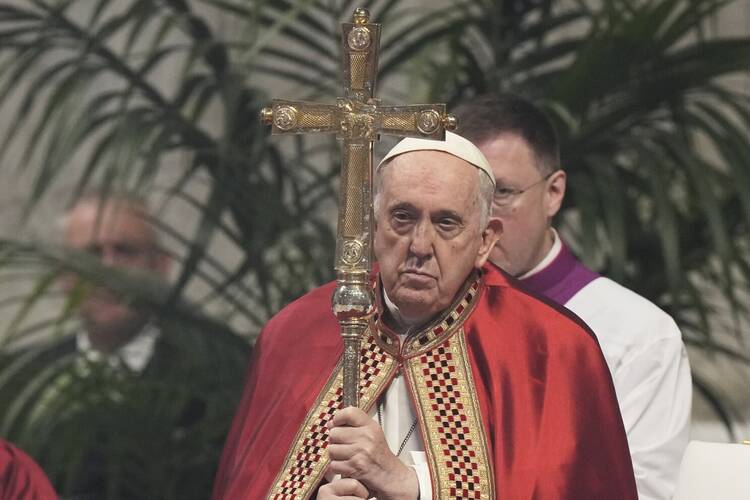ROME (AP) — The Jesuits said Monday that a famous artist priest is definitively expelled from the religious order for sexually, spiritually and psychologically abusing women, and lamented they couldn’t prosecute him more vigorously under the Vatican’s internal procedures.
The Rev. Marko Ivan Rupnik remains a Catholic priest but is no longer a Jesuit priest, after he didn’t appeal his June expulsion decree, said Rupnik’s former superior, the Rev. Johan Verschueren.
Rupnik, a Slovenian priest, is one of the most celebrated religious artists in the Catholic Church. His mosaics decorate churches and basilicas around the world, including at the Vatican.
Late last year, the Jesuits acknowledged Rupnik had been accused by several women of sexual, spiritual and psychological abuse over 30 years. He had largely escaped punishment until then, apparently in part because of his exalted status in the church and at the Vatican, where even Pope Francis’ role in the case came into question.
The Jesuits announced in June that they determined the women’s claims to be “very highly credible.”
After conducting an investigation, the Jesuits announced in June that they determined the women’s claims to be “very highly credible.”
They said they had kicked Rupnik out of the order because of his “stubborn refusal to observe the vow of obedience.” The Jesuits had exhorted Rupnik to atone for his misconduct and enter into a process of reparation with his victims, but he refused.
“I cannot but greatly regret this insistent and stubborn inability to confront the voices of so many people who have felt hurt, offended and humiliated by his behavior and conduct toward them,” Verschueren wrote in a letter obtained Monday confirming the expulsion.
At the same time, Verschueren acknowledged criticism that Rupnik still remains a priest, who now has no religious supervision whatsoever. He said the Vatican’s current legislation precluded an investigation that could have led to a harsher penalty — the most stringent church penalty is to defrock a priest, essentially making him a regular layman again.
If Rupnik wants to preach and celebrate the sacraments publicly, he will have to find a friendly bishop to take him in.
It was a reference to the fact that at the time of Rupnik’s alleged abuse, the Vatican didn’t usually punish sexual or other types of misconduct between priests and adult women, considering any such relations consensual. The Vatican has recently begun to recognize such misconduct as criminal, but new laws can’t be applied retroactively, and the Vatican is generally loathe to make exceptions to punish old misconduct involving adults.
Going forward, if Rupnik wants to preach and celebrate the sacraments publicly, he will have to find a friendly bishop to take him in — something that isn’t out of the question since he retains steadfast supporters.
Among them are the leaders of the Aletti Center, an ecumenical study center and mosaic art studio founded by Rupnik in the 1990s in Rome. In June, the current leader, Maria Campatelli, issued a strong defense of Rupnik, calling the allegations against him “defamatory and unproven.” In an open letter, she said the claims amounted to a form of media “lynching” against the priest and his art center.
She added that Rupnik had himself asked to leave the Jesuits in January and that other Jesuit priests at the Aletti center made similar requests because of their “overriding distrust of superiors.” Verscheueren confirmed Rupnik requested to leave but said that was denied because the Jesuits wanted him to make amends with his victims.
In a January interview with The Associated Press, Francis denied he had intervened other than procedurally.
On Monday, Verscheueren said the order would distance itself legally from the Aletti Center, which no longer has a Jesuit community in residence. The Jesuits inaugurated the center in 1993 and are linked to it canonically as a public association of the faithful. Verscheureren said the Jesuits plan to exit the association and terminate the partnership.
Francis’ role in the case came into question after the Jesuits acknowledged that Rupnik had been briefly declared excommunicated in 2020 for having committed one of the most serious crimes in the Catholic Church — using the confessional to absolve a woman with whom he had engaged in sexual activity. The excommunication was lifted two weeks after it was declared, raising the question of whether Francis had intervened on behalf of his fellow Jesuit.
In a January interview with The Associated Press, Francis denied he had intervened other than procedurally, to keep new allegations against Rupnik in the same tribunal as older ones. At the same time, Francis seemed to know far more about the outcome than the Jesuits had revealed, saying also that Rupnik had paid compensation to the woman.








